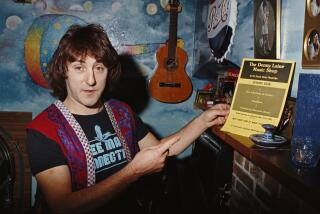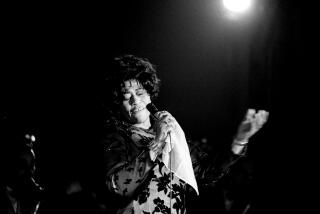Danny Barker; Guitar, Banjo Great Spanned 60 Years of Jazz
NEW ORLEANS — Danny Barker, a champion of the banjo and a virtuoso guitarist whose career spanned 60 years with jazz giants of all eras, has died. He was 85.
Barker died Sunday of cancer at home in his sleep. He had been diagnosed as having the disease in January.
Although too weak to play, he reigned as the Mardi Gras king of the “Krewe du Vieux” on Jan. 29--a day designated by the city as Blue Lu and Danny Barker Day to honor the musician and his wife, Louise.
Louise Barker, famous in her own right, picked up her nickname as a blues singer--particularly from performances of some of Barker’s risque compositions.
Barker’s last performance was New Year’s Eve at Preservation Hall.
“No one will ever replace Danny Barker because he was an original,” said Doc Cheatham, a trumpeter who played with Barker in Cab Calloway’s orchestra in the 1930s. “He went through the years of everything that happened (in jazz). That will never be again.”
Barker was presented with the 1991 Lifetime Achievement Award by the National Endowment for the Arts, which designated him a jazz master. Shortly afterward, the U.S. Postal Service issued a cachet honoring him.
Barker could play any style of music. He started with Storyville jazz banjo at 16, switched to guitar for big band swing in the 1930s, appeared in orchestra clips in movies and became a widely known soloist on the 1947 radio program “This is Jazz.” He even played amplified guitar for rhythm and blues in the 1950s.
But he was known mainly for the kind of guitar he played with Cab Calloway’s orchestra--single-string solos with technical virtuosity. He was among the first to take jazz guitar out front, beyond the unheralded position of backup rhythm.
He played with the giants of jazz: King Oliver, Jelly Roll Morton, Louis Armstrong, Sidney Bechet, Red Allen, Bunk Johnson, Charlie Parker, Dizzy Gillespie and Wynton Marsalis.
He was particularly fond of the banjo and was determined to help restore it to popularity--contributing significantly to the mid-century ragtime revival.
Barker composed throughout his career. “Save the Bones for Mr. Jones” was one of his most famous, recorded by Johnny Mercer and Nat (King) Cole. His most recent composition was “Palm Court Strut,” recorded in 1992.
Barker wore a pencil-thin mustache, and in recent years his appearances frequently capitalized on his deadpan wit, accented by derby hat, flashy jacket and a repertoire of one-liners and banjo-backed vocals.
Barker and his wife of 63 years had one daughter, Sylvia Barker of Rochester, N.Y.
More to Read
The biggest entertainment stories
Get our big stories about Hollywood, film, television, music, arts, culture and more right in your inbox as soon as they publish.
You may occasionally receive promotional content from the Los Angeles Times.










